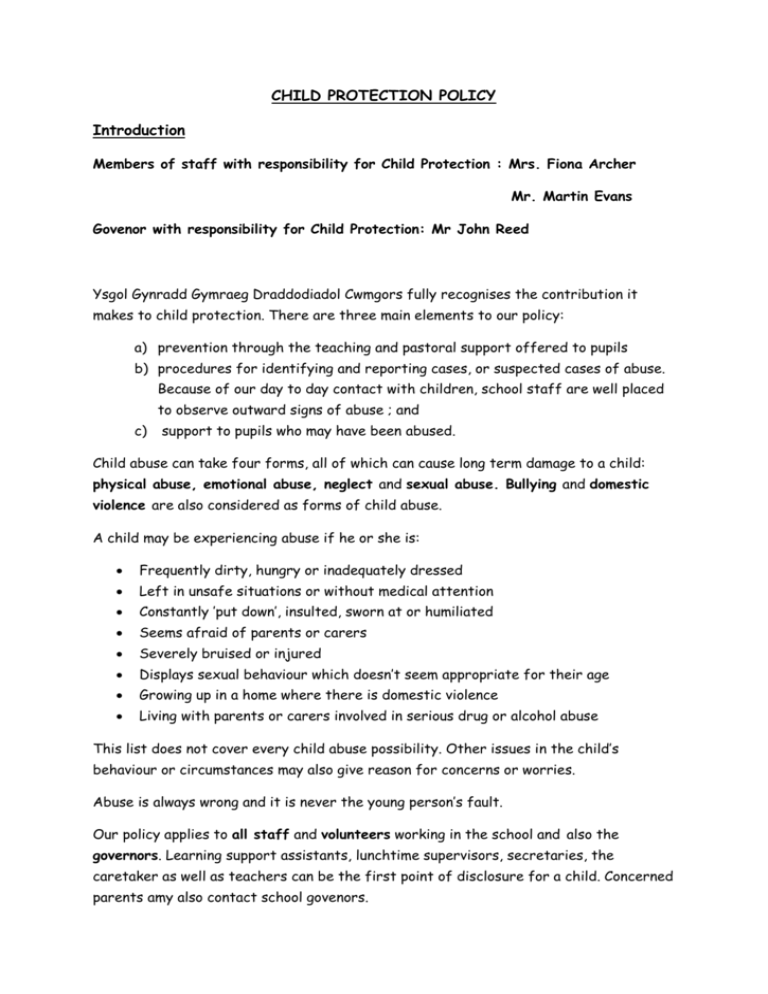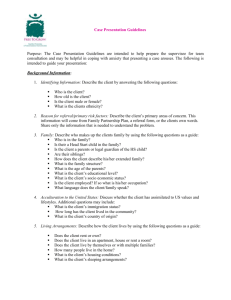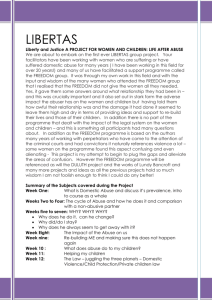child protection policy
advertisement

CHILD PROTECTION POLICY Introduction Members of staff with responsibility for Child Protection : Mrs. Fiona Archer Mr. Martin Evans Govenor with responsibility for Child Protection: Mr John Reed Ysgol Gynradd Gymraeg Draddodiadol Cwmgors fully recognises the contribution it makes to child protection. There are three main elements to our policy: a) prevention through the teaching and pastoral support offered to pupils b) procedures for identifying and reporting cases, or suspected cases of abuse. Because of our day to day contact with children, school staff are well placed to observe outward signs of abuse ; and c) support to pupils who may have been abused. Child abuse can take four forms, all of which can cause long term damage to a child: physical abuse, emotional abuse, neglect and sexual abuse. Bullying and domestic violence are also considered as forms of child abuse. A child may be experiencing abuse if he or she is: Frequently dirty, hungry or inadequately dressed Left in unsafe situations or without medical attention Constantly ’put down’, insulted, sworn at or humiliated Seems afraid of parents or carers Severely bruised or injured Displays sexual behaviour which doesn’t seem appropriate for their age Growing up in a home where there is domestic violence Living with parents or carers involved in serious drug or alcohol abuse This list does not cover every child abuse possibility. Other issues in the child’s behaviour or circumstances may also give reason for concerns or worries. Abuse is always wrong and it is never the young person’s fault. Our policy applies to all staff and volunteers working in the school and also the governors. Learning support assistants, lunchtime supervisors, secretaries, the caretaker as well as teachers can be the first point of disclosure for a child. Concerned parents amy also contact school govenors. Prevention We recognise that high self-esteem, confidence, supportive friends and good lines of communication with a trusted adult helps prevention. The school will therefore: i. Establish and maintain an ethos where children feel secure and are encouraged to talk, and are listened to. ii. Ensure children know that there are adults in the school whom they can approach if they are worried or in difficulty. iii. Include in the curriculum activities and opportunities for PSE which equip children with the skills they need to stay safe from abuse and to know to whom to turn for help Procedures We will follow the procedures set out in guidance produced by our Local Safeguarding Children Board which are in line with the All Wales Child Protection Procedures. The school will: 1. Ensure it has a dedicated senior member of staff, who has undertaken the appropriate training provided by the local authority as a minimum. 2. Recognise the role of the designated person and arrange support and training. 3. Ensure every member of staff and every governor knows: -The name of the designated person and their role -that they have an individual responsibility for reporting child protection concerns using the proper channels and within the timescales agreed with the Local Safeguarding Children Board; and - How to take forward those concerns where the designated person is unavailable. 4. Ensure that members of staff are aware of the need to be alert to signs of abuse and know how to respond to a pupil who may disclose abuse. 5. Ensure that parents have an understanding of the responsibility placed on the school and staff for child protection by setting out its obligations in the school prospectus. 6. Provide training for all staff so that they know: -their personal responsibility - the agreed local procedures - the need to be vigilant in identifying cases of abuse, and -how to support a child who discloses abuse 7. Notify the local authority team if: -It should have to exclude a pupil on the child protection register either for a fixed term or permanently; and -If there is an unexplained absence of a pupil on the child protection register of more than two days duration from the school (or one day following a weekend). 8. Work to develop effective links with relevant agencies and co-operate as required with their enquiries regarding child protection matters including attendance at initial case conferences, core groups and child protection review conferences. 9. Keep written records of concerns about children ( noting the date, event and action taken) , even when there is no need to refer the matter to social services immediately. 10. Ensure all records are kept secure and in locked locations. 11. Adhere to the procedures set out in the Welsh Assembly Government guidance circular 40 when an allegation is made against a member of staff. 12. Ensure the criminal background of applicants for vacant posts are checked in accordance with Welsh Assembly Government guidance circular ‘Child Protection: Preventing Unsuitable People from working with Children in Education Sector 41’ and 13. Designate a governor for child protection who will oversee the school’s child protection policy and practice. Supporting the pupil at risk We recognise that children who are abused or witness domestic violence may find it difficult to develop a sense of self- worth and to view the world as benevolent and meaningful. They may feel helplessness, humiliation and some sense of blame. This school may be the only stable, secure and predictable element in the lives of children at risk. Nevertheless, when at school their behaviour may be challenging and defiant or they may be withdrawn. The school will endeavour to support pupils through: a. The content of the curriculum to encourage self- esteem and self- motivation b. The school ethos which: - Promotes a positive, supportive and secure environment; and - Gives pupils a sense of being valued c. The schools’ behaviour policy is aimed at supporting vulnerable pupils in school. All staff will agree on a consistent approach which focuses on the behaviour of the offence committed, but does not damage the pupils’ self-worth. The school will endeavour to ensure that the pupil knows that some behaviour is unacceptable but that he/she is valued. d. Liaison with other agencies who support the pupil, e.g Social Services, Child and Adolescent Mental Health Services and the Education Welfare Service e. Keep records and notify Social Services as soon as there is a recurrence of a concern. When a pupil on the child protection register leaves, we will transfer information to the new school immediately and inform Social services. Bullying Our policy on bullying is set out in the school’s anti-bullying policy and is reviewed regularly by the governing body. Children with Additional Learning Needs We recognise that statistically children with behavioural difficulties and disabilities are most vulnerable to abuse. School staff who deal with children with disabilities, sensory impairment and/ or emotional and behaviour problems will be particularly sensitive to signs of abuse. Monitoring and review The school will review this policy when necessary and will monitor its effectiveness. This policy will be promoted and implemented across the school. July 2012






